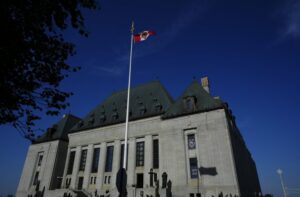
What do swearing, climbing a tree and shooting a dog with a stun gun all have in common? You can’t do any of them in a Toronto park, as per the city’s current bylaws.
Coun. Josh Matlow says he agrees with the last one on that list, “but it is peculiar that that, in itself, is just the focus of what you’re not allowed to do to a dog,” he says half jokingly.
While that is an example of one of the more peculiar park bylaws, Matlow says there are several others on the books that are either outdated or nonsensical, with many requiring permits or carrying fines.
“I’ve received complaints from residents who have seen signs in some of our parks that have bylaws that are either absurd or single certain groups out from enjoying our parks,” he says.
“If you are to throw a Frisbee or fly a kite — you’re not allowed to do that and you have to get a permit.”
Matlow recently received a complaint from a constituent who sent him a picture of signs at Sunnybrook Park (pictured above) that read, among other things:
“Ball playing and Frisbee by permit only”
“Cyclists must dismount on hills”
“Kites or model aircraft prohibited”
“No picnics without a permit”
The City of Toronto says the bylaw related to Frisbee, ball playing and picnics as seen in that sign relates specifically to organized sports and groups of 25 or more. But that’s not clear from the sign. After CityNews inquired, the City responded that staff have been made aware it could be confusing.
“Many of us who grew up in Toronto and Canada, we do know that if we see a sign saying ‘you’re not allowed to fly a kite.’ Well, you’re with your friends, you’re with your kid, you might just do it anyway. You know that [bylaw officers] aren’t going to run after you,” Matlow says, adding he recognizes that as a privileged approach.
“But if you’re new to this country and you expect that the rules are there for a reason, you may likely abide by those rules. And often, I’ve heard anecdotally, that if you are Indigenous, if you’re racialized, you are more likely to be penalized than if you’re not.”
As such, Matlow says he sees getting rid of some archaic rules as an equity issue.
“You’re not allowed to have a picnic with more than 25 of your friends and family. There are many groups of people who come here — racialized communities, new Canadians — who very often want to come together in [larger groups] in large parks, like at the island, cherry beach, Sunnybrook, and more. And I just don’t think we should be putting up barriers to people who just want to come and enjoy our open spaces,” he says.
Speaking to CityNews at June Rowlands Park, he cited the Davisville area as an example of how parks play a role in social equity and access.
“You’ll see here in Davisville, there are many people who have the privilege of having a backyard if they live in a house here. We also have many neighbors who live in apartments where there is no outdoor access. This is their front and backyard. And I want everyone in Toronto, no matter who you are, no matter what your economic means might be, to know that our parks are there for you and your families to enjoy,” he says.
Matlow will be bringing a motion forward at the next city council meeting on April 23 for City staff to do a thorough review of park bylaws that he feels no longer serve the community.
“It looks like they haven’t been reviewed in decades. And now that I’ve actually received complaints from residents about how absurd and wrong they are, I think it’s responsible to review them,” he says.
“Just really archaic things like not being able to launch or land a hot air balloon in a park. Let’s just clean this stuff up and bring it to the 21st century and allow people to have some fun.”
Matlow acknowledges that old, often comedic sounding bylaws aren’t the biggest problem the City is facing in the current world climate.
“This isn’t the most important issue happening in the world today, but for those who are impacted and those who are affected, I think it’s important to do [this review] because there are enough rules going up in the world that are separating us and hurting us. I think that we should be relieving some of those bizarre and sometimes discriminatory rules that get in the way of Torontonians being able to have a good time and a good quality of life,” he says.
“And I think it’s time to start, modernizing, cleaning up [the bylaws] and have rules that protect our collective health and safety, but get rid of rules that get in the way of ourselves.”




